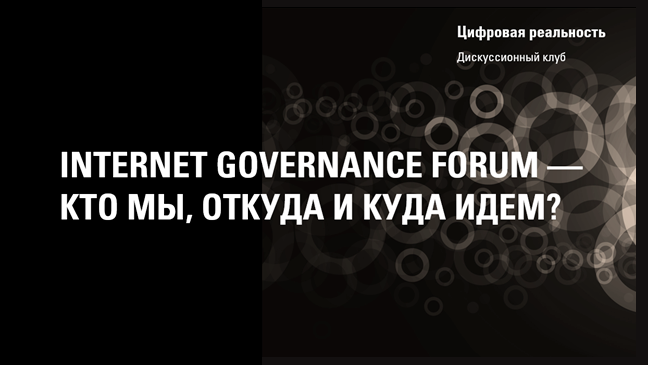
On October 29, the Digital Reality discussion club had a regular meeting combined with a meeting of the Internet Governance Committee of the Coordination Center for TLD .RU/.РФ. The participants discussed the next Internet Governance Forum (IGF), which will take place on December 6-10 in Katowice, Poland. The forum will be held in a hybrid format, with most of the participants joining the event online due to the pandemic.
This is the 16th IGF; the first forum was held in October 2006 in Athens as a new platform for international discussion of internet governance issues. Over the years, the forum has been often criticized, but now the community has launched the difficult process of transforming the forum into a more serious format for global digital cooperation.
Ilona Stadnik, the center's youth project coordinator, reviewed how the focus of the IGF agenda has changed in retrospect since it was inaugurated in 2006. Roman Chukov, Russia's representative in the IGF Multistakeholder Advisory Group, shared the details of drafting the IGF 2021 program and details of coordinating with the Polish government. He also mentioned the recent changes that will influence the IGF under the UN Secretary-General's digital cooperation roadmap, including the possible creation of a new high-level multistakeholder group that should help consolidate IGF decisions for legislators at the national level.
Independent expert Alexandra Kulikova spoke about blockchain technologies and crypto exchange regulation. She noted that these issues have not been given enough attention on the IGF agenda and that this situation needs to be changed.
ICANN Senior Stakeholder Engagement Manager for Eastern Europe and Central Asia Mikhail Anisimov noted that internet governance, as a field of study, is developing rapidly, and seeing it split into narrow specializations would be a logical consequence of this growth.
Mr. Anisimov said, “Internet governance has always included the widest range of topics, from access to the network to content regulation. Once closely related, these subjects have been drifting further apart on this endlessly branching tree. It is only logical that there are separate thematic areas now when it comes to respective research and discussion. One of them is the Technical Management of the Internet, which explores the processes occurring on the network and relies on a deep understanding of the operating principles of the technical infrastructure of the internet. So in the future we are likely to see the emergence of more specific disciplines describing different areas of internet operations.”
Director of the Coordination Center for TLD .RU/.РФ Andrey Vorobyev noted that the IGF remains one of the best platforms for cooperation between organizations involved in internet governance. “ICANN72 focused on more active participation on the corporation’s representatives in the IGF and other internet governance platforms, including more intensive interaction with the International Telecommunication Union, the World Intellectual Property Organization and other international agencies,” he said. “The process of internet governance is constantly evolving, and the key to solving old and new problems is cooperation and constructive collaboration.”
The attendees and online participants went on to discuss the pros and cons of the IGF, and also expressed their assumptions about how useful future UN-driven reforms will be for the forum. Its current mandate ends in 2025, and by that time the global IG community should have a plan to go forward and a clear understanding of whether the forum is needed at all or if new formats for stakeholder interaction need to be considered.
The video is available here.



